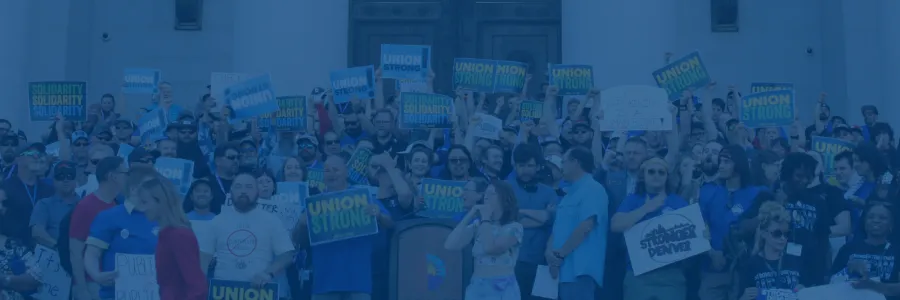
Unions are about workers coming together to build power.
Forming a union is the best way to ensure everyone is treated fairly at work.
Across the US, union members earn better wages and benefits than workers who are not part of a union.
It's a fact: it makes a difference to have a union at work.
Why a Union? | español |
Why organize a union?
Nobody should have to put up with unfair treatment but standing up to management on your own can be difficult. Without a union, management can treat employees arbitrarily. When you and your co-workers come together to form a union, you can protect and improve your wages, benefits and working conditions – by negotiating a contract as a union. If there is a problem at work or improvements you want to see made, your union will have your back.
Workers in a union benefit from:
A voice at work Unionized workers have a say about their working conditions and can negotiate improvements. | Enforceable contract Unionized workers have a legal contract that protects their wages, benefits and conditions at work. | Accountability Workers in a union have access to formal procedures and resources to dispute unfair treatment. | Collective power There’s strength in numbers. Unions level the playing field, providing workers with an equal voice to management. |
The Union Advantage
The data proves there’s value in having a collective voice. Studies have shown that workers in a union are more likely to benefit from higher wages and better benefits.
A union is a democratic organized group of workers who unite to have a voice on the job and have a say in their working conditions. Being part of a union gives workers the right to negotiate for workplace improvements as a group with their employer, in the form of a union contract. Once a contract has been negotiated and democratically voted in by the membership, it is also a union’s role to enforce it. Unions empower workers, defend their rights and keep employers accountable.
Unions are democratic non-profit organizations with leaders elected by the membership every few years. They are governed by clear constitutions, bylaws and other rules that are accessible to and changeable by the membership at regularly held conventions or meetings.
Ultimately, unions begin with workers. There are millions of union members in the United States, who know that by standing together they can achieve greater things than on their own.
When you and your co-workers come together to form a union, you can protect and improve your wages, benefits and working conditions. Some of the benefits of forming a union include:
- A voice at work: Unionized workers have a say about their working conditions and can negotiate improvements.
- Enforceable contract: Union members have a legal contract that protects their wages, benefits and conditions at work.
- Accountability: Workers in a union have access to formal procedures and resources to dispute unfair treatment.
- Collective power: There’s strength in numbers. Unions level the playing field, providing workers with an equal voice to management.
There is value in having a collective voice at work, and the data proves it. Studies have shown that workers in a union are more likely to benefit from:
- higher wages (11.2% more than what nonunion workers make)
- employer-provided health insurance (94% compared to 68%)
- access to paid sick days (91% compared to 73%);
- retirement benefits through private employers (82% to 48%); and
- guaranteed pensions through private employers (54% to 8%).
The union advantage is even greater for people of color, women, immigrants, and others who have confronted workplace discrimination. A union contract provides an assurance that all workers will be treated fairly at work.
A union means access to better workplace security and safety for workers. When workers have higher wages and better benefits, their work is positively affected, meaning better services for the community at large.
Regarding for-profit work— the gap between CEO pay and worker pay is at an all time high. The best way to fight for equality and your rights is to join or start a union. Together we can push back against billionaires exploiting us and get the pay, benefits and working conditions we deserve.
Collective bargaining is the process of negotiation between employees and their employer over wages, working conditions, benefits, and other workplace issues.
A committee of your co-workers — chosen by you and your fellow union members — drafts an agreement known as a "union contract" on every issue of concern to our bargaining unit. The committee negotiates as equals with management.
Once the committee and management reach an agreement it is shared with you and your co-workers.
The majority of members must approve the agreement before it can become accepted as a contract.
